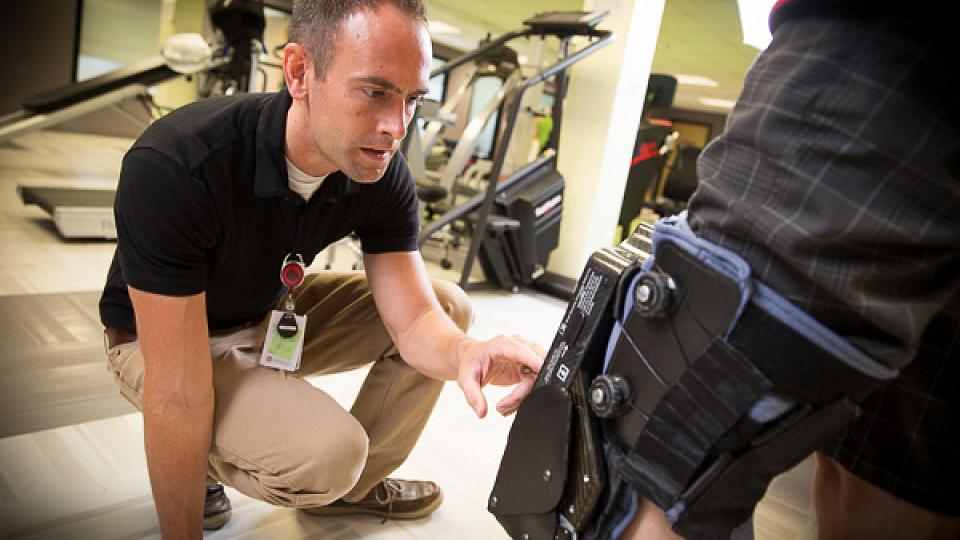
Amy: This is Amy Steinbrech talking with Dr. Steven Edgley, the director of stroke rehabilitation at the University of Utah Health Care.
Dr. Edgley, thank you for joining me so much in studio for a podcast on stroke recovery.
Dr. Edgley: My pleasure.
Stroke in Young Adults
Amy: Every year, more than 795,000 people in the United States suffer a stroke. Strokes are becoming more common among young adults in the prime of their life. I'm wondering if you could tell me a little bit about stroke recovery process in the young stroke survivor.
Dr. Edgley: It's true that about 10% of stroke patients are under the age of 50. This population represents a special population in terms of the unique challenges they face that are generally in the crux of their career and raising families, and this life event is very hard for most people. I find that all stroke patients who have a loss of function, they go through certain stages of mourning or loss.
We talk about the Kubler-Ross stages of mourning, which entails denial, bargaining, things like anger, and, ultimately, acceptance. I find that especially in the young stroke patient, meaning younger than, say, 50, these patients need to be guided towards things that will improve their chances for recovery before they reach the level of acceptance. Oftentimes stroke patients don't fully realize their own potential.
Amy: So this is somewhat pushing the stroke patient to their potential and making them realize their potential?
Stroke Recovery
Dr. Edgley: Exactly. It takes a lot of guidance and someone actually, a whole team of people to guide them through the barriers that they encounter, medical, physical, emotional, everything.
Amy: Right. So I guess one way to look at a stroke is it's a process from beginning to end. Stroke recovery is truly a process.
Dr. Edgley: That's exactly right. A process that takes a lot of support. For many people that are young, they have the potential to get back to high level things like driving, or returning to work. They just need a little guidance and the resources and a team of people to help them along.
Amy: Young adults are often faced with this different set of circumstances than elderly stroke patients. They have a long life expectancy in front of them.
Dr. Edgley: I think it's critical to set the patient on the right course for their next future decades. And getting them set up with the things that will truly provide quality of life, like being able to access the community, like being able to recreate and like being able to form meaningful relationships with friends and family. And for some people, like being able to return to their former employment, or at least do some service, activities, which is helpful to their overall quality of life.
Amy: Remaining engaged with community and family I'm sure is a big part of that.
Dr. Edgley: Yes. Yes.
Stroke Rehabilitation Challenges
Amy: How do young patients sell themselves short oftentimes?
Dr. Edgley: You know, when patients have a stroke, it's a really traumatic life event. They probably don't see their friends and family going through and succeeding without the process of recovery. They don't know what to expect. They don't know how to get themselves out of this black pit. I think many patients come to a certain level of comfort and realize that things will be okay in their life in terms of their basic needs, but don't really have an idea what to reach for. Many times the limits of people are limits that they put on themselves.
Amy: Self imposed. Yeah.
Dr. Edgley: Now, that's not to say that every stroke patient has the potential to get that back to 100%, the way their life was in the past. Certainly reaching and striving to get as much quality of life, and be as independent in the community is really important.
Amy: Recognizing your potential.
Dr. Edgley: Yes.
Amy: Have you experienced other people putting limits on stroke patients?
Dr. Edgley: I do see occasionally some people around the stroke patient who, based on misinformation, have some assumptions what the stroke patient's potential is. We commonly deal with this in therapy. For example, the patient's family member tries to do everything for the patient without giving them the chance to learn how to do the activities themselves. That's a common occurrence, and a simple matter of just educating the family members to let's try to promote as much independence as possible. And the way to do that is you learn by doing.
Amy: Right. Most often finding that balance, that perfect balance between independence and dependence.
Dr. Edgley: Yes.
Stroke Support Network
Amy: What are some of the barriers, Dr. Edgley, do young stroke patients face in recognizing their potential?
Dr. Edgley: I would say, again, a stroke is a major life event and it requires a major life adjustment. Some people are able to adjust better than others on their own.
Amy: Right.
Dr. Edgley: Most people are able to adjust more effectively with a broad network of support, including family, friends, and rehab specialists. With time we like to promote higher level goals, like return to work if possible. For that to occur, you have generally got to have a supportive employer who is willing to take a chance. Stroke patients have the potential to be superb employees.
Amy: Dr. Edgley, what advice or tips do you have for the young stroke patient?
Dr. Edgley: Accept yourself and where you are. But don't accept the limitations that you perceive or that other people put on you.
updated: April 7, 2021
originally published: December 10, 2014





